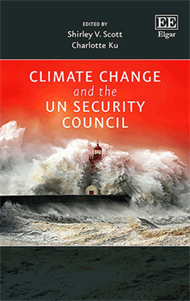
Professor Charlotte Ku, Associate Dean for Global Programs and Graduate Studies, is co-editor of a new book Climate Change and the UN Security Council that explores what role the council should play in addressing global security challenges stemming from climate change.
Environmental changes will inevitably be accompanied by social, economic, security and governance upheavals, even crises. What should and what could the UN Security Council (UNSC) do in these situations?
In the book, cross-disciplinary experts examine how existing council “tools,” such as tribunals, peacekeeping, sanctions, and legislation could be adapted to constructively prevent, prepare for, or mitigate conflicts and crises resulting from climate change.
Ku edited the book with Professor Shirley V. Scott, Head of the School of Humanities and Social Sciences, UNSW Canberra, Australia. Ku and Scott co-authored the introductory and concluding chapters on the council and global action on climate change. In an additional chapter, Ku analyzes the council’s role in developing a responsibility to respond to the climate change challenge.
Ku, in a recent interview, underscores the escalating scale and scope of the global security impacts of climate change and the need for action.
“Climate change is the latest non-armed force threat added to the UN Security Council’s list of threats to peace and security that now includes diseases and flows of funds,” says Ku.
“From what began as a fringe issue in the Security Council context, climate change—and the destruction and displacement climate events bring— is now taking on some urgency for coordinated and collective action.”
Informing the Debate
Ku and Scott analyzed what the UNSC can do to lessen climate insecurity in the op-ed "The UN Security Council as a Climate Governance Institution," posted by the Australian Institute of International Affairs. In a recent report, Australia's Senate Committee on Foreign Affairs, Defence and Trade concluded that "climate change is exacerbating threats and risks to Australia's national security."
The Planetary Security Initiative, an international think tank consortium, says of Ku’s book:
“In light of recently adopted UNSC resolutions in which climate change is included as root cause of conflict and the ongoing debate on creating an institutional home for climate-security at the UN, this volume is very timely and a must read for those willing to learn more about how the UNSC could step up its contribution to this field.”
According to Edward Elgar Publishing, the book’s publisher, “Scholars, activists, and policy makers will find this book a fertile source of innovative thinking and an invaluable basis on which to develop policy.”
About Charlotte Ku
Charlotte Ku is Professor of Law and Associate Dean for Global Programs and Graduate Studies at Texas A&M University School of Law.
Ku recently rejoined the Academic Council on the United Nations System (ACUNS) Board of Directors as Vice Chair. From 1998-2000, she served as the Chair.
Previously, Ku was Professor of Law and Assistant Dean for Graduate and International Legal Studies at University of Illinois College of Law.
Ku served as Acting Director of the Lauterpacht Centre for International Law, University of Cambridge, and was Executive Director and Executive Vice President of the American Society of International Law from 1994 to 2006.
Her research focuses on international law and global governance. Ku is also the author of International Law, International Relations, and Global Governance (Routledge, 2012).
View Ku’s other publications and presentations.